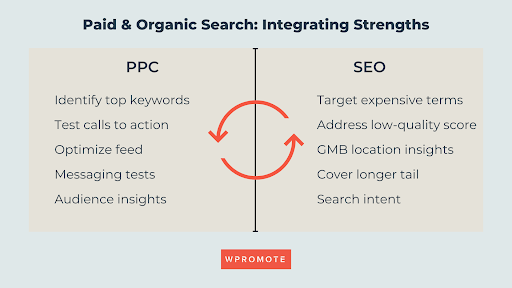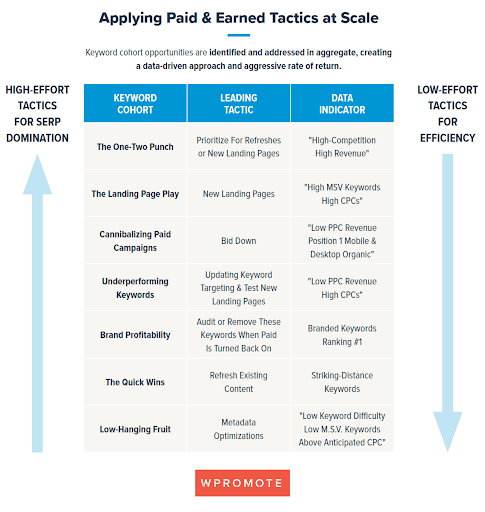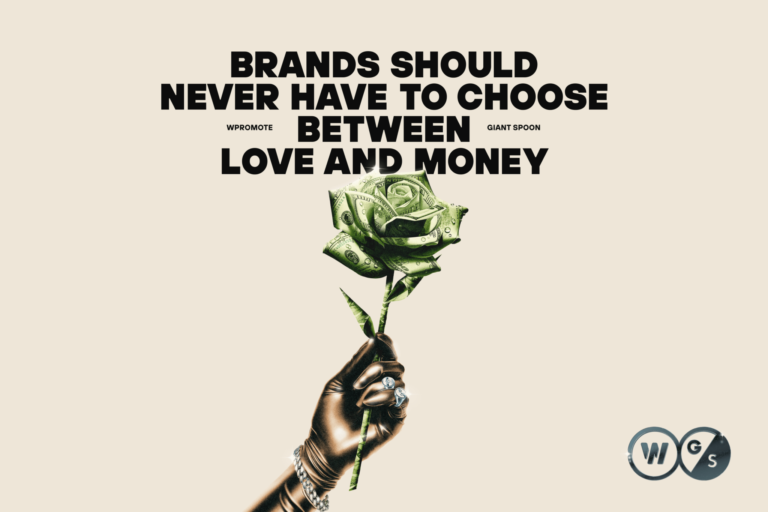It can be hard not to think of organic and paid search as an either/or situation. More often than not, businesses put all of their eggs in the paid search vs. organic search basket or approach them as completely distinct, which essentially means that both channels end up less effective and often leads to inefficiencies and duplicate effort.
So how do you combat the standalone search blues? Start looking at everything that’s on the SERP (paid, organic, and whatever Frankenstein of content Google has built into a zero-click result) as one strategy, and consider paid and organic search as two sides of the same coin.
This ideally starts on the executive level by setting complementary goals across teams, educating the experts on either side on a hybrid approach, and incentivizing paid and organic search marketers to work together. In a perfect world, an in-house search team should be just that: one team, united under the SERP. And if you’re working with an agency or agencies to hit your marketing goals, you need to consider the effect of separate agencies handling your SEO and PPC efforts that can view each other as competition.
For example, an analysis of 25 Wpromote accounts running paid search and SEO campaigns revealed that organic-assisted revenue for paid search increased 293% once SEO was added onto the account. SEO also accounted for 9% of total PPC revenue as it filled the funnel with first-touch new users via non-brand SEO strategies.
Whatever your approach, it’s time to work smarter, not harder, by implementing a hybrid strategy that will not only help your business achieve its goals but ensure you’re making the best use of your budget and effort.
Two types of search, both alike in dignity: paid and organic
Let’s start with the obvious: why are these two different types of search strategies separate to begin with? SEO is traditionally seen as a long-term, slower building investment, while PPC is more likely to see immediate results. People trust organic results more, but it’s easier to get your pages to the top of a SERP, especially a competitive one, by paying for the placement. SEO is dependent on algorithms that are often opaque, and PPC is much easier to control.
But it turns out that the similarities outweigh the differences: both aim to drive traffic and conversions, driven by keywords.
Here’s an example of a common problem that can be solved with a hybrid approach. PPC teams often rely on under-optimized landing pages featuring sub-par content, which drives costs up and leads to bad customer experience (which in turn can hurt conversion rates). While PPC landing pages are often fundamentally different from organic pages and focused on a conversion-focused action, they still need to consider the overall customer experience and how it aligns with the intent behind their actual search terms that got them there.
Working in tandem with earned media experts like SEO strategists, who excel at optimization strategies and identifying search intent, and content marketers, who specialize in creating strong content that appeals to your customers, will maximize efficiency and effectiveness in paid search.
A hybrid search strategy ensures that you have:
- Maximized SERP coverage
- A consistent content story and customer experience
- Messaging alignment
- Paid and organic insights that inform and improve both SEO and PPC efforts
- Full-funnel coverage that includes every touchpoint
- More efficient investment planning and better ROI
- Short-term wins balanced with long-term brand value
Bringing paid and organic search together under one umbrella ensures your business is mitigating the weaknesses of each channel alone and taking full advantage of the strengths.
What light through yonder window breaks? ‘Tis an integrated approach to search that makes both channels work better
It’s a fact that 94% of searchers will skip past the paid ads on top to go directly for the organic results. Consumers tend to distrust paid results because they’ve paid to be at the top and because there are a fair amount of irrelevant paid search results appearing on SERPs as a result of broad-match bidding and a lack of awareness around search intent on the paid side.
One of the major risks you’re taking if you’re only investing in direct response, lower-funnel marketing like PPC is the eventual, inevitable performance plateau. To sustain long-term growth and avoid diminishing returns, you need earned media to bring in new audiences and create new sources of demand. Otherwise, you’re at risk of exhausting your existing audiences.
Organic campaigns often take a long time to gain momentum and you may not see a return on your investment for quite a while, ranging from weeks to months or even years. Landing pages for organic campaigns might be further up the funnel and more content-heavy and educational instead of focused directly on lower-funnel conversion.
Integrating paid and organic search can move more people down the funnel, delivering better incrementality and sustaining long-term growth.
That’s why a combination of paid and organic search is the answer: organic marketing builds your brand authority, fills the funnel, and drives qualified traffic you can capture and convert with the right mix of performance marketing tactics. Paid search drives both brand awareness by putting your business at the top of the SERP and direct conversions, especially if they are working with an SEO team to get more precise about their keyword targets using search intent insights.
Benefits to paid search from SEO:
- Improved site speed & user experience
- Improved conversion rates & increased time on-site
- Increased quality score to drive CPCs down
- Avoiding cannibalization
- Open up budget if pages are performing well organically on the SERP
Benefits to SEO from paid search:
- Utilize paid testing methodology to improve messaging strategy for organic content
- Use paid search keyword data to help inform organic keyword strategy
So how do you actually get started?
To thine own search be true: building your hybrid strategy
Like all great things in marketing, integrating your search strategies begins with testing. We explore the paid-organic channel alignment for our clients by deploying organic vs. paid pressure tests, starting with identifying areas of opportunity to determine the impact of running paid support on branded core organic terms. That helps us answer important questions like “is organic search capitalizing on this traffic or are we losing out to competitors?” and “can we drive stronger return on these terms?”
You need to use that information to remove assumptions from the equation and determine a strategic and holistic SEO/PPC approach on those branded core terms, ensuring you’re spending media budget on the keywords with the most impact.
We’ve leveled up our integrated search game at Wpromote using marketing automation; we built an app in our Polaris tech platform called Keyword Cluster Analysis that applies machine learning to mass amounts of cross-channel search data to create unique sets of keyword cohorts so paid and organic teams can collaborate effectively on a keyword-level approach to optimizations, budget, and on-site content.
Always keep in mind that you have two directives: you want to dominate the SERP and you want to increase efficiency.
So you need to balance the level of effort with the eventual impact these initiatives will have on your overall goals. That’s particularly true when you’re applying these tactics at scale.
Focus on these key opportunities when examining potential next steps in your hybrid strategy launch:
- Use paid search to test keywords, headlines, and calls to action you can utilize organically to make your SEO and content campaigns go further faster
- Use data and insights from your organic search campaigns to identify keywords to use in your paid efforts, especially high-intent, lower funnel keywords
- Repurpose your most engaging organic content through paid search to raise traffic and elevate awareness
- Use paid and organic search together to maximize your presence on the SERP
All the SERP’s a stage, and a hybrid search strategy lets your brand take the spotlight
Integrating paid and organic search can be difficult, but the effort is worth it. As the good ship digital marketing continues to hurtle forward at a breakneck pace, it will only get harder to backtrack and bring your teams, data, and strategy together. Now is the time to make your move.
Start the conversation with your team about:
- Opening up lines of communication between your channel teams
- Fully integrating your data sources and reporting
- Identifying cross-channel opportunities and aligning customer experience
- Unlocking flexible marketing budgets
- Testing up the funnel if you’re over-indexing on direct response
It’s really up to you how you want to pair your paid efforts with what you’re doing organically. By pairing them together, you can set yourself up for success on the SERP playing field and inform future decisions with important insights.
Download the full guide to Earned Media growth marketing strategies to explore how a hybrid strategy can work for you.








